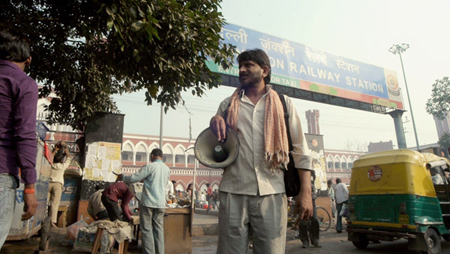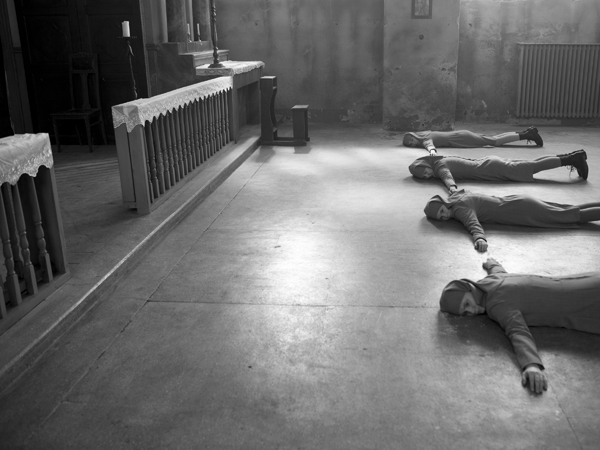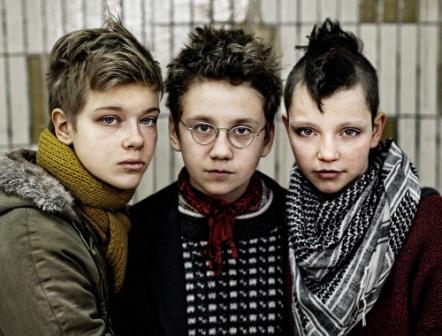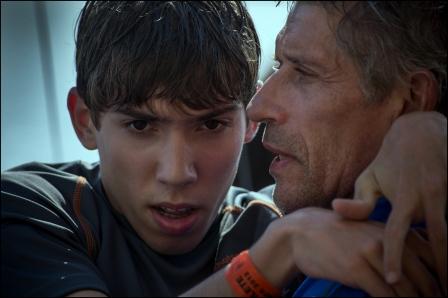An Indian father accompanies his young—and only—son, Siddharth, to an outdoor bus station. He waves goodbye to his smiling boy as the packed bus drives off 200 miles north, where Siddharth has been sent to work in a trolley factory. The boy, nicknamed Siddhu, is supposed to come back a month later for Diwali, but he never returns. His dad, Mahendra (the quietly dignified Rajesh Tailang), doesn’t have his son’s workplace phone number, the name of his son’s boss, or even a photo to give to the police—he’s also not sure of the boy’s age (he could be 11 or 12). When asked to describe Siddhu, Mahendra replies that his son has dark straight hair parted on the side, to which a police officer replies that that could be any boy in India. Mahendra finds out, though, that his son disappeared two weeks earlier at lunch time and that he was possibly kidnapped and taken to a mysterious place called Dongri.
Siddharth is one of many sleepers that premiered at the recent Toronto International Film Festival. Most of the following films may have been overshadowed by the big pick-up deals and red carpet gala screenings, but they were easily among the best in the overall programming. All arrived at the time without a U.S. distributor.
Shot on the fly throughout India, Siddharth, the second feature film by Canadian director Richie Mehta, was inspired by a conversation the director had with a Mumbai rickshaw driver, whose son had vanished without a trace. Though Mehta doesn’t downplay the horrifying scenario, he calmly concentrates on the father. The twists and turns derive from the dad’s tunnel vision, which will collide and create a push-and-pull reaction among a Western, Internet- and smartphone-savvy audience. Much of the cast are non-professional, beautifully blending in with the lead actors. Tannishtha Chatterjee (Brick Lane) plays Siddhu’s more knowing mother.
Polish-born, British-based director Pawel Pawlikowski makes a confident return to form with the elegantly sparse and absorbing Ida, a huge change of pace after his ho-hum thriller The Woman in the Fifth. Ann, a novitiate in a convent, is told by her mother superior that before she takes her vows, she must meet her only living relative. The pretty but dowdy 21-year-old ventures from her rural convent to Warsaw with a beaten up suitcase held together by a belt. When she arrives at her Aunt Wanda’s apartment, she’s greeted by a 40ish woman smoking a cigarette and wearing a bathrobe, her hair disheveled, while in the background, a man gets dressed.
Immediately the film highlights the contrast between the sheltered Anna and her cynical (and perhaps pragmatic) aunt, a boozy and self-described slut. Wanda’s a judge, known as “Red Wanda” for having prosecuted state enemies, and she questions her niece as though presiding over a courtroom (“So, you’re a Jewish nun?”). Anna was born Ida Lebenstein, but having grown up in the convent, she has no memory of her family and no idea that she is Jewish. Wanda doesn’t know exactly what became of Anna’s/Ida’s family but assumes that they were murdered by their farming neighbors.
The mystery justifies the road trip that the two take to find out what happened to Ida’s parents, and along the way they pick up a handsome hitchhiking saxophonist. (Wanda’s advice to her niece: “You should try carnal love.”) As Wanda, Agata Kulesza dominates any given setting, while Pawlikowski deliberately keeps Anna/Ida (Agata Trzebuchowska) under wraps as an enigma. Set in 1962, the drama looks like a time capsule. You could confuse it with Polish films from that era, and the black-and-white photography lends an added level of starkness to the bleak winter location. The shots are composed so that the background looms larger, making Idea and Wanda look like stick figures overwhelmed by history. I overheard one colleague say that this film would have been edgy 20 years ago, but Pawlikowski isn’t going for edge. It’s a multilayered character piece.
Another recharged director, David Gordon Green, arrived with the strong and tough-minded Joe, starring a beefy and tattooed Nicholas Cage as the title character, in easily his best role in more than a decade. This harsh Southern gothic is even more brutal than Green’s thriller Undertow (2004), and his most atmospheric (his recent Prince Avalanche was also filmed in and around Austin, Texas). The film begins with a beating and doesn’t let up and is so full of heavy drinking that the screen reeks of alcohol. If the story shares the sense of fatalism as Cage’s Leaving Las Vegas, it also has a similar coming-of-age passage as Mud, though far more downscale. The latter also showcases teenage actor Tye Sheridan as a smart, earnest kid looking for stability through a father figure, but here, Joe warns him, “Don’t fool yourself about me.”
An ex-con, Joe supervises a team of day laborers who poison pines trees for lumber, and he reluctantly hires the teenage Gary and his father: the 15-year-old is too young, and the drunk dad (the late and terrifyingly vicious Gary Poulter, in his only film role) doesn’t so much walk as wobble. After the dad gets into a fight, Joe cans him but allows Gary to come back; he’s the only one making money for his family. Overall, the drama’s a tad overlong, though the ominous tension doesn’t flag. Not for the faint of heart, it’s a dog-kill-dog slab of life. Much of the story will feel recognizable from other movies, but this tale of revenge and retribution is certainly memorable.
A decade ago, Palestinian director Hany Abu-Assad’s Private received an Oscar nomination for Best Foreign Language Film. His latest, Omar, won a Special Jury Prize this year at Cannes, and, remarkably, his new political thriller has a similar plotline as the Israeli entry Bethlehem, which also screened at the festival. Both films have just been submitted for this year’s foreign film Oscar and have landed the same distributor, Adopt Films. They should make for a sharp, though depressing, compare-and-contrast double feature.
The underground world of espionage, once the domain of the Cold War (secrets, blackmail, betrayal), has made itself at home on the West Bank, and both movies involve an informer for the Israelis, a young Palestinian male, living on the other side of the security wall. Abu-Assad has asserted that his film is the first feature made mostly by both Palestinian crew members and financing. It was largely filmed in Ramallah.
His movie borrows a bit of its setup from a 1930s Warner Brothers crime drama. Three lifelong friends in their early twenties are comrades in a brigade with itchy fingers, targeting Israeli soldiers (“Every day we wait is another day of occupation”): the group’s leader, the comic relief, and the romantic lead (heartthrob in the making Adam Bakri). However, a teenage girl, the sister of one of the trio, becomes the cause of a rivalry between the remaining two.
The film’s condemnation of Israel’s use of collaborators, informers forced to provide human intelligence, resonates loud and clear. The storyline is unquestionably daring and disturbing, playing out like a revenge drama. But unlike the darkly comic or surreal violent imagery of, say, the films of Elia Suleiman, the violence here is defiantly and brutally a means to an end.
In Bethlehem, retribution is more credible, unpredictable, and personal. Director Yuval Adler, who had served in Israeli Military Intelligence, co-wrote with Palestinian journalist Ali Waked. In this debut feature, the use of a Palestinian informer is even more incendiary: the asset, who has a brother aligned with Hamas, is 17. He’s more vulnerable, not only because of his age but for having a years-long bond with his Secret Service handler, Israeli family man Razi (Tsahi Halevy). Fluent in Arabic, Razi genuinely feels protective towards Sanfu (Shadi Mar’i), even when the kid doesn’t realize all of the behind-the-scene strings Razi pulls to insulate him, and throughout the years, he has rewarded the teen with gifts (though a flashy iPhone may not be the most inconspicuous).
There are many different types of turf wars going on: the Palestinian Authority vs. Hamas, Razi taking on upper management, Sanfur vs. his hardline family. The storyline never moves in a direction that loses the plot’s inner-logic. Like in Omar, this is a male-dominated battlefield, but Bethlehem takes jabs at the machismo posturing and preening, questioning when personal pride gets in the way of the political. The back-to-basics direction also includes a lucidly choreographed shoot-out between a militants and the Israeli army, where the suspense derives from what you can’t see around the dark corner. Perhaps most impressively, Adler brings out volatile performances from his non-professional cast (the film shares a father, actor Tarek Copti, with Omar).
After running from screening to screening, We Are the Best! was a gift for the blurry-eyed filmgoer. It’s better than a triple espresso; its lead actresses grab your attention and take off with it. Director Lukas Moodysson won a lot of attention with Together (2000) and Lily 4-Ever (2002). Here again, he has young people figured out. A more convincing group of 13-year-olds would be hard to find.
Based on the graphic novel by Moodysson’s wife, Coco, the film throws viewers back to Sweden during the early 1980s. Synth-pop rules the music scene, but punk offers a refuge for bespectacled Bobbo and brassy Klara, sporting a pseudo-Mohawk. It takes them a split second to decide to form a band to spite a heavy-metal guy band, even though the two are clueless about music, but what could be more punk? It dawns on them that at least one member of the group should have some experience, so they ask a classmate who they know won’t turn them down—another outsider, Hedwig, a devout Christian with no friends.
They’re all flying by the seats of their baggy pants, and the handheld, whirlwind camera barely keeps up with their energy. The title earns its exclamation point. Don’t be too surprised if you go away chanting their anthem, “Hate the Sport” or “Brezjnev Reagan Fuck Off.” Whatever you do, though, don’t call them a girl band.
One more surprise was The Finishers, a sentimental family drama with a strongly committed cast. It’s mainstream French cinema at its most emotionally appealing in which a father and son become closer as they participate together in an Ironman contest. The catch? Seventeen-year-old Paul (Fabien Héraud) has congenital palsy. His distant father is a former Ironman competitor, now unemployed and aimless, and Paul becomes inspired by a real-life family in Massachusetts who competed in the competition.
For an entire day, Julien swims, pulling a tethered raft with his son onboard; bikes with Paul riding backseat; and runs, pushing his son’s wheelchair. (Dad, played by Jacques Gamblin, is more fit than the average 20-year-old.) Filmed during the actual Ironman France Competition in Nice last year, this movie is always on the move, never dwelling too long as it follows a familiar route, and debut actor Héraud has a mega-watt smile that outshines Julia Robert’s. After countless movies with dark subject matter (Joe or James Franco’s Child of God), it’s a welcomed cynicism-buster. No self-pity or self-destructive behavior here, but cheers and tears.






















Leave A Comment